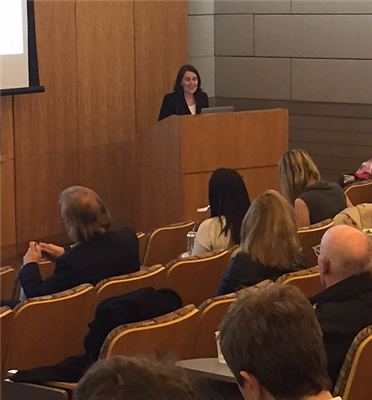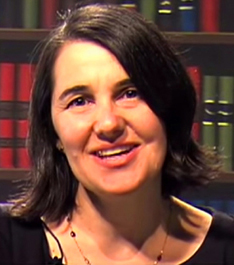|
|
|

2015 NEWSLETTER
|
|
 Wilfred C. Hulse Award/Lecture, "Understanding Disruptive Mood Dysregulation Disorder: From Temper Tantrums to Bipolar Disorder," featuring Cathryn A. Galanter, MD Photos Wilfred C. Hulse Award/Lecture, "Understanding Disruptive Mood Dysregulation Disorder: From Temper Tantrums to Bipolar Disorder," featuring Cathryn A. Galanter, MD Photos
Tuesday, November 17, 2015, 7:30-9:30 p.m.
NYU SOM, Joan and Joel Smilow Research Center, 522 First Ave, Smilow Rm, New York, NY 10016
Last evening, Dr. Cathryn Galanter gave her Hulse lecture on regarding her research on the understanding of bipolar and DMDD in children. It was fantastic to have a great attendance (35) and a great follow-up discussion on the topic. Dr. Galanter is a role model for so many of us and we are all thrilled about her research and her involvement in mental health organizations such as the New York Council. Thank you very much Dr. Galanter for the amazing presentation on DMDD.
“Cathryn is an amazing role model for all women child psychiatrists. She was the first recipient of my namesake fellowship and deserves all the awards she received especially the Hulse.”
Clarice Kestenbaum, MD
“Cathryn has been a great mentor and supporter to me since I was a PGY 2 and others . . . a truly great teacher to many of us.”
Jose Vito, MD
Wednesday, November 4, 2015, 7:00-9:00 p.m.
MIST Harlem, 46 West 116th Street, New York, NY
Resources: TIP SHEET and
November 4, 2015 marked the inaugural mix, mingle, brainstorm, and planning meeting of the International Committee of the NY Council on the Child and Adolescent Psychiatry (NYCCAP). In the middle of West Harlem, in a swanky and spacious location called, MIST, several child and adolescent psychiatrists, trainees, and other allied health professional therapists, networked and discussed fresh ideas for this committee. This meeting was exciting for many reasons, but what the board members and committee chairs loved the most were the presence of new faces captured by this event, who have not attended others in the past.
This meeting started and ended informally, with drinks and food, with a more formal gathering in the middle. During the "more formal part," everyone made them selves comfortable, in the lounge-like setting, and Committee Co-Chairs (Drs. Angel Caraballo, Khadijah Booth-Watkins, Vera Feuer, and Olga Leibu), President, Scott Palyo and other board member attendees (Drs. Iliyan Ivanov, Jose Vito, Jennifer Cabrera, Melvin Oatis, Carolina Zerrate, and Scott Shaffer) discussed goals for this committee. We also discussed lessons learned from the ESCAP International Congress in Madrid, Spain earlier this year and plans for AEPNYA's 60th Congress, June 1-4, 2016 co-hosted by AACAP in San Sebastian, Spain.
During this part of the evening, attendees were encouraged to consider attending and presenting at the conference in Spain this summer. In this effort, there was an informal discussion about the intricacies of international presentations accompanied by "International Speaking Tips Outline." Afterwards, there was a lively discussion about the role of this committee and the ways in which it can support its members. The generated ideas included collaborating with organizations from other countries to foster and develop collegiate international relationships and ideas of how to advocate for financial support for international endeavors from employers/institutions for mutually beneficial growth among others. Finally, we discussed the NYCCAP’s International Committee role in supporting such endeavors, including helping prepare for presentations, facilitating formation of international relationships, and even looking for ways to provide some financial stipends to those interested in global mental health.
This is just the beginning and there will be much more to come from our international cohort and their enriching perspectives. Please stay tuned for upcoming events and submit your abstracts to the AEPNYA Congress due December 15, 2015. Muchas Gracias!!

On October 28, 2016 at AACAP's Annual Meeting in San Antonio, TX, NYCCAP members were officially elevated to Distinguished Fellow status: Iliyan Ivanov, MD; Angel Caraballo, MD; Vera Feuer, MD; Carol Kessler, MD; Khadijah Booth-Watkins, MD; Kareem Ghalib, MD; and Meena Ramani, MD.
CONGRATULATIONS TO ALL!
Wednesday, October 7, 2015, 7:00 – 9:00 p.m. at the Weill Cornell Medical College. The NYCCAP
Collaborative Care Committee, co-chaired by George Alvarado, MD, Annie Li, MD,
Meri Weiss, MD, and Susan Yeung, MD (MIT), hosted a conference on school
refusal, Attendance reached nearly 70 with an
excellent Q&A session (photo gallery). The conference featured:
John T. Walkup, MD
Director, Division of Child and Adolescent
Psychiatry
New York-Presbyterian Hospital and Weill Cornell
Medical College;
Stephen Donovan, MD
Assistant Professor of Clinical Psychiatry Research Psychiatrist,
Depression Evaluation Service, New York
State Psychiatric Institute, School Psychiatrist, Home Instruction; and
Samantha Morrison, PhD
Assistant Professor of
Clinical Psychology (in Psychiatry)
Columbia University Medical Center, Columbia University Clinic for Anxiety
and Related Disorders-Westchester (CUCARD-W)
Here are NYCCAP's learning points from the conference:
- First things first: Getting the child back to school is
always first priority
- Help family problem solve around realities of getting
the child to school (Involve fathers and explore what other family
members/friends etc can help)
- Educate and reinforce with school staff/nurse to
redirect child (home with fever, vomiting, diarrhea only) and help
implement behavioral plan
- Go back to basics: Basic behavioral interventions (when
done right) should be efficient in getting the child back to school.
- Functional analysis and “dismantling” the behaviors
(identifying and addressing internal/external negative/positive
re-inforcers) often helps parents understand the behaviors and apply
behavioral interventions more efficiently
- Medications may be necessary to address underlying
anxiety/mood issues, but behavioral interventions should be front and
center
- Setting limits from the beginning regarding
privileges/rewards/consequences (including using
electronics/responsibilities/chores at home)
- Prepare parents for “extinction burst” (including
reviewing potential safety concerns arising and preparing safety
plans/need for risk assessments etc)
- If starting an SSRI concurrent to implementing a
behavioral plan prepare parents that emerging suicidality/tantrums may be
due to extinction burst rather than side effects of medications
- Practice morning routine (keep it brief) during non
high stress times (Monday mornings most stressful) to
habituate/desensitize kids (reinforce/reward positive behaviors)
- Include all caregivers
- Involve pediatricians and teachers early on and provide
anticipatory guidance regarding age of vulnerability/onset and
importance of prevention/early intervention
|
|
|
|
|